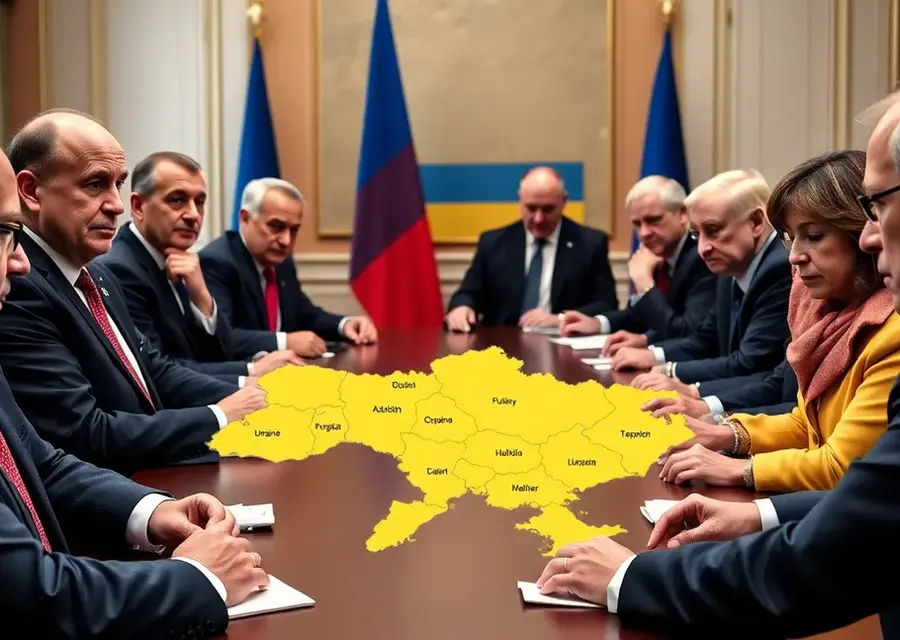Unpacking Ukraine Security Guarantees: Russia's Stance and Global Diplomacy
- THE MAG POST

- Aug 22, 2025
- 5 min read

The intricate dance of international diplomacy surrounding Ukraine's security guarantees is a topic of paramount importance, especially given the current geopolitical climate. As global powers deliberate on potential frameworks to ensure Kyiv's safety and deter future aggression, the complexities are immense. Russia's firm insistence on being an integral part of any security dialogue, coupled with its stated view that excluding Moscow renders discussions futile, presents a significant challenge. This stance underscores the deep-seated geopolitical tensions and the delicate balancing act required to forge a lasting peace.
Navigating these discussions requires a nuanced understanding of each nation's strategic interests and historical context. The recent high-level meetings, while indicative of a global commitment to finding a resolution, also highlight the significant obstacles that lie ahead. The very notion of security guarantees for Ukraine is intertwined with broader questions of regional stability and the balance of power. As such, any proposed solution must be robust, inclusive, and, above all, sustainable in the long term, ensuring that the hard-won peace is not merely a temporary reprieve but a foundation for enduring stability.
Navigating the Complexities of Ukraine's Security Guarantees
The quest for enduring peace in Ukraine is fraught with intricate geopolitical challenges, particularly concerning the security guarantees that Kyiv seeks. Recent diplomatic engagements, including high-profile meetings with international leaders, underscore the global effort to find a resolution to the ongoing conflict. However, a significant hurdle remains: Russia's insistence on participating in any security framework related to Ukraine, a stance that Moscow views as non-negotiable for any meaningful progress. This assertion highlights the deep-seated divisions and the need for a delicate balancing act in crafting a stable future for the region.
Russia's Stance on Security Discussions
Russia has unequivocally stated that any dialogue concerning Ukraine's security without its involvement is destined to fail. Foreign Minister Sergey Lavrov articulated this position forcefully, emphasizing that excluding Moscow from these critical discussions renders them a "road to nowhere." This declaration comes in the wake of European leaders convening with U.S. President Donald Trump to deliberate on security assurances for Ukraine. Lavrov's sentiment suggests that genuine collective security in the region is unattainable without Russia's active participation and consent, framing any alternative approach as inherently flawed and counterproductive.
The Imperative of Russian Inclusion
The Russian perspective hinges on the belief that regional security is a shared responsibility, and any attempts to establish security arrangements for Ukraine while sidelining Russia are fundamentally misguided. Lavrov's assertion that discussing security issues without Moscow is a "utopia" underscores this viewpoint. He implies that the West, and particularly the United States, must recognize the futility of such endeavors. This stance positions Russia as an indispensable stakeholder whose consent is paramount for any resolution to be considered legitimate or effective in the long term.
Furthermore, Russia has expressed concerns that European nations might be making "clumsy attempts" to sway the U.S. president's stance on Ukraine. Lavrov noted a lack of constructive proposals from European leaders during recent high-level meetings. This observation suggests a perception of diplomatic maneuvering rather than genuine problem-solving. Russia's insistence on meticulous preparation for any potential summit between Presidents Putin and Zelenskyy further emphasizes its desire to control the narrative and ensure outcomes align with its strategic interests, thereby avoiding any potential "deterioration" of the situation.
International Diplomatic Efforts and Obstacles
The international community is actively engaged in diplomatic initiatives aimed at de-escalating the conflict and establishing a stable framework for Ukraine's future. These efforts, however, are complicated by divergent national interests and strategic objectives. While some nations advocate for robust security guarantees for Ukraine, others, like Russia, prioritize their own security concerns and influence within the region. The role of key global players, such as the United States, is pivotal, yet their exact commitment and approach remain subject to ongoing negotiation and political considerations.
Coordinated Efforts for Security Guarantees
Following discussions in Washington, Ukraine has initiated intensive coordination with national security advisors from key European and NATO member states. The objective is to solidify concrete military security guarantees and erect robust defenses against future aggression. Andriy Yermak, the Chief of Staff to Ukraine's President, highlighted these ongoing efforts, mentioning extensive coordination with advisors from Germany, Italy, France, the United Kingdom, and Finland, alongside representatives from the EU and NATO. This collaborative approach signifies a unified front among Ukraine's allies in bolstering its security infrastructure.
Ukraine's military teams are actively developing the defense components of these proposed guarantees, signaling a proactive stance in securing its sovereignty. Yermak also issued a stark warning, emphasizing that Russia must either take appropriate steps towards peace or face intensified, "painful" global pressure. This dual approach—pursuing diplomatic solutions while preparing for continued confrontation—reflects the gravity of the situation and Ukraine's determination to achieve a just and lasting peace, underscoring the importance of these security guarantees.
NATO's Role and Military Discussions
NATO military leaders convened to deliberate on the specifics of potential security guarantees for Ukraine, aiming to broker a ceasefire and establish a foundation for lasting peace. The NATO Military Committee, comprising 32 defense chiefs, participated in a video conference, including U.S. General Alexus Grynkewich, who oversees NATO operations in Europe. The alliance's focus is on establishing a framework that could support any future peace agreement, with a coalition of 30 nations, including European countries, Japan, and Australia, already pledging support for this initiative.
Examining Potential Security Frameworks
The core of these military discussions revolves around the operational mechanics of a potential security force designed to backstop a peace agreement. The precise role the United States will play remains a critical point of consideration, especially after President Trump's explicit statement ruling out the deployment of U.S. troops to defend Ukraine against Russian aggression. This U.S. position significantly influences the scope and feasibility of the proposed security arrangements, necessitating alternative strategies to ensure Ukraine's long-term security and stability.
Russia's consistent refusal to accept NATO troops in Ukraine adds another layer of complexity to these deliberations. Meanwhile, Poland has voiced concerns about continued Russian provocations, particularly following reports of a suspected Russian drone incursion into its airspace. Polish Defense Minister Wladyslaw Kosiniak-Kamysz characterized the incident as a provocation occurring at a crucial juncture when peace discussions are underway, highlighting the volatile nature of the geopolitical landscape and the persistent challenges in achieving a stable resolution.
The Final Solution: A Path Towards Sustainable Peace
Achieving sustainable peace in Ukraine necessitates a comprehensive approach that addresses the security concerns of all parties involved while upholding international law and Ukraine's sovereignty. The ongoing diplomatic efforts, military discussions, and the intricate web of security guarantees being explored are crucial steps in this complex process. However, the path forward requires genuine commitment to dialogue, a willingness to compromise, and a clear understanding of the long-term implications of any agreement reached. The ultimate aim is to forge a future where Ukraine can thrive, free from the threat of aggression, and where regional stability is firmly established.
Key Aspect | Details |
Russia's Stance | Moscow insists on participation in Ukraine security talks; exclusion is a "road to nowhere." |
Diplomatic Efforts | European leaders and US President Trump engage in discussions for Ukraine's security guarantees. |
Russian Concerns | Lavrov suggests "clumsy attempts" by Europeans to influence US policy; lack of constructive ideas noted. |
Ukraine's Actions | Kyiv coordinates with European/NATO advisors for military security guarantees and prevention of aggression. |
NATO's Involvement | Military chiefs discuss potential security frameworks for Ukraine to support a peace agreement. |
Key Challenges | US ruling out troops in Ukraine; Russia's refusal of NATO troops in Ukraine; Polish drone incident highlighting provocations. |
Path to Peace | Requires comprehensive approach, addressing all parties' concerns, upholding international law and Ukraine's sovereignty. |






















































Comments